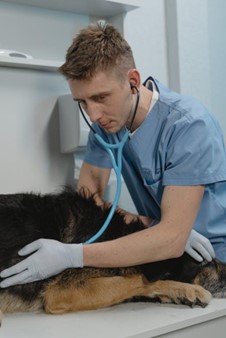Key Considerations in Responsible Pet Vaccination

As pet owners, ensuring the health and well-being of our furry companions is a top priority. Responsible vaccination is one of the most fundamental ways to protect our pets from preventable diseases. Vaccination not only safeguards individual pets but also contributes to the overall health of the pet population by preventing the spread of contagious diseases. However, responsible pet vaccination involves more than just scheduling regular shots. It requires informed decision-making and collaboration between pet owners and veterinarians.
This article explores the key considerations in responsible pet vaccination.
Understanding Your Pet’s Lifestyle and Risk Factors:
Every pet is unique, and their vaccination needs may vary based on factors such as age, breed, health status, and lifestyle. For example, indoor cats may have different vaccination requirements than outdoor cats who are exposed to more potential diseases. Similarly, dogs that frequent dog parks or boarding facilities may require additional vaccinations for protection against highly contagious diseases like canine influenza. By assessing your pet’s lifestyle and risk factors, you can work with your veterinarian to develop a tailored vaccination plan.
Following Vaccination Guidelines:
Veterinarians adhere to established vaccination guidelines set forth by organizations such as the American Animal Hospital Association (AAHA) and the American Association of Feline Practitioners (AAFP). These guidelines recommend core vaccines that are essential for all pets, as well as non-core vaccines that may be recommended based on individual risk factors. Pet owners must familiarize themselves with these guidelines and discuss them with their veterinarian to ensure their pet receives the appropriate vaccinations at the right time.
Balancing Risks and Benefits:
Like any medical intervention, vaccines carry potential risks as well as benefits. While adverse reactions to vaccines are rare, they can occur, particularly in pets with underlying health conditions or a history of vaccine sensitivity. Pet owners should openly communicate with their veterinarian about any concerns or previous reactions their pet may have had to vaccines. Together, they can weigh the risks and benefits of each vaccination and make informed decisions regarding which vaccines are necessary for their pet’s health.
Following Vaccine Schedules:
Adhering to recommended vaccine schedules is essential for ensuring optimal protection against diseases. Vaccines are typically administered in doses, followed by booster shots at regular intervals to maintain immunity. Missing scheduled vaccinations or delaying boosters can leave pets vulnerable to disease. Pet owners should maintain accurate vaccination records and schedule regular appointments with their veterinarians to stay on track with their pet’s vaccination schedule.
Monitoring for Vaccine-Preventable Diseases:
While vaccines provide essential protection against many diseases, they are not 100% effective. Pet owners should remain vigilant for signs of vaccine-preventable diseases, such as respiratory symptoms, lethargy, vomiting, diarrhea, or changes in behavior. Prompt veterinary care is crucial if a pet displays any concerning symptoms, as early intervention can improve the outcome of treatment.
Avoiding Over-Vaccination:
Over-vaccination, or administering vaccines unnecessarily or more frequently than needed, can pose risks to pets without providing additional benefits. Some vaccines provide long-lasting immunity, and booster shots may not be necessary as frequently as once thought. Working with a veterinarian who follows current vaccination guidelines can help prevent over-vaccination and ensure that pets receive only the necessary vaccinations.
Considering Individual Health Status:
Pets with certain health conditions, such as autoimmune disorders or a history of severe allergic reactions, may require special considerations regarding vaccination. Certain vaccines may sometimes be contraindicated, or alternative vaccination schedules may be recommended to minimize potential risks. Pet owners need to provide their veterinarian with a comprehensive medical history of their pet and discuss any underlying health concerns before proceeding with vaccinations.
Promoting Herd Immunity:
Responsible pet vaccination protects individual pets and contributes to the concept of herd immunity within the pet population. By vaccinating a significant proportion of pets within a community, the spread of contagious diseases can be significantly reduced, ultimately benefiting all pets, including those who may not be able to receive vaccines due to medical reasons. Pet owners can play a vital role in promoting herd immunity by ensuring that their pets are up-to-date on their vaccinations and encouraging others in their community to do the same.
Consulting with a Specialist:
In certain cases where pets have unique health concerns or require specialized care, consulting with a veterinary specialist, such as a veterinary immunologist or infectious disease expert, can provide valuable insights into the most appropriate vaccination protocol. These specialists can offer tailored recommendations based on the latest research and advancements in veterinary medicine, ensuring that pets receive the most effective and personalized vaccination approach possible.
Making informed decisions
By understanding your pet’s lifestyle and risk factors, following established vaccination guidelines, and balancing risks and benefits, you can ensure that your furry companion receives the necessary protection against preventable diseases. Adhering to vaccine schedules, monitoring for vaccine-preventable diseases, and avoiding over-vaccination is essential to maintaining your pet’s health.
Consider your pet’s health status, promote herd immunity, and consult with specialists when necessary to demonstrate a commitment to providing the best possible care for your beloved companion. Work collaboratively with your veterinarian and stay informed about advancements in veterinary medicine. You can then make informed decisions that prioritize your pet’s health and longevity.




























